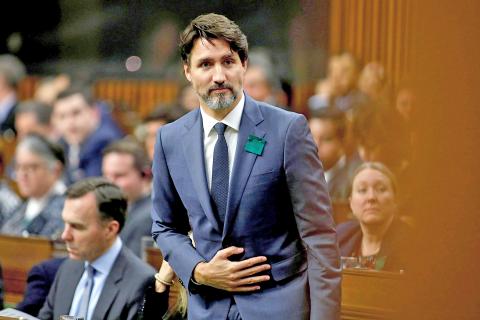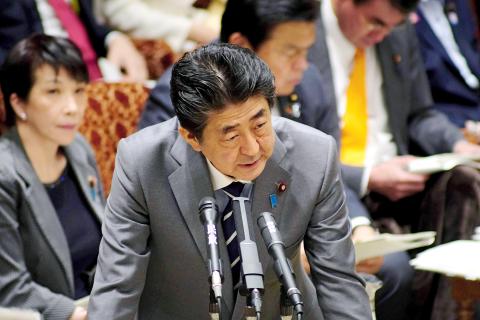President Tsai Ing-wen (蔡英文) yesterday thanked Canadian Prime Minister Justin Trudeau and Japanese Prime Minister Shinzo Abe for their support of Taiwan’s bid to join the WHO as the number of confirmed 2019 novel coronavirus cases in the nation increased to nine.
“Particularly, I want to thank the US, Canada, Japan and other countries for publicly supporting Taiwan’s bid to join the WHO, as well as other international friends who have recently voiced support for Taiwan’s inclusion in the WHO,” Tsai said at the Presidential Office in Taipei as she reassured people about the government’s ability to prevent an epidemic.
“Taiwan is capable of and responsible for making contributions to the world. The WHO must not exclude Taiwan due to political factors,” she said.

Photo: Reuters
Trudeau, after circumventing a question by Canadian Conservative Party leader Andrew Scheer about Taiwan’s inclusion in the WHO in parliament on Tuesday, became assertive when answering the same question from lawmaker Michael Cooper on Wednesday.
“This is a question about Taiwan,” Cooper said, stressing Taiwan by spelling it out. “Does the government support the inclusion of Taiwan in international discussion about the virus? Again, Taiwan, yes or no?”
“Yes, Mr Speaker. As we did during the time of the SARS virus, we support Taiwan’s meaningful participation in international multilateral forums. Especially when its presence provides important contributions to the global public good. We believe that Taiwan’s role as an observer in World Health Assembly meetings is in the best interest of the international health community and it also is an important partner in the fight against this epidemic,” Trudeau said.

Photo: AFP
His remarks were greeted by applause.
It was the first time that a Canadian prime minister had publicly voiced support for Taiwan’s bid to join the WHO, following similar gestures by Canadian Deputy Prime Minister Chrystia Freeland and former Canadian minister of health Ginette Petitpas Taylor, the Ministry of Foreign Affairs said in a statement.
Separately yesterday, Abe told the Japanese parliament that Taiwan’s participation in the WHO is necessary to effectively combat the spread of the novel coronavirus, Kyodo news reported.
“It will be difficult to maintain health and prevent further infections in this region if [Taiwan] is excluded for political reasons,” Abe was cited as saying. “We will continue to make our country’s stance clear at the WHO.”
On Wednesday, Saint Lucian Prime Minister Allen Chastanet issued a statement calling on the WHO to include Taiwan.
“Given Taiwan’s proximity, its importance as a transport hub and its 23 million population, Saint Lucia urgently calls on the WHO ... to ensure that there is full involvement of the Taiwanese authorities in the international consultations, planning and decisionmaking to monitor, control and ultimately halt the further spread of the coronavirus,” the statement said.

RESILIENCE: Deepening bilateral cooperation would extend the peace sustained over the 45 years since the Taiwan Relations Act, Greene said Taiwan-US relations are built on deep economic ties and shared values, American Institute in Taiwan (AIT) Director Raymond Greene said yesterday, adding that strengthening supply chain security in critical industries, enhancing societal resilience through cooperation and deepening partnerships are key to ensuring peace and stability for Taiwan in the years ahead. Greene made the remarks at the National Security Youth Forum, organized by National Taiwan University’s National Security and Strategy Studies Institution in Taipei. In his address in Mandarin Chinese, Greene said the Taiwan-US relationship is built on deep economic ties and shared interests, and grows stronger through the enduring friendship between

GAINING STEAM: The scheme initially failed to gather much attention, with only 188 cards issued in its first year, but gained popularity amid the COVID-19 pandemic Applications for the Employment Gold Card have increased in the past few years, with the card having been issued to a total of 13,191 people from 101 countries since its introduction in 2018, the National Development Council (NDC) said yesterday. Those who have received the card have included celebrities, such as former NBA star Dwight Howard and Australian-South Korean cheerleader Dahye Lee, the NDC said. The four-in-one Employment Gold Card combines a work permit, resident visa, Alien Resident Certificate (ARC) and re-entry permit. It was first introduced in February 2018 through the Act Governing Recruitment and Employment of Foreign Professionals (外國專業人才延攬及雇用法),

The Ministry of Transportation and Communications yesterday said that it would redesign the written portion of the driver’s license exam to make it more rigorous. “We hope that the exam can assess drivers’ understanding of traffic rules, particularly those who take the driver’s license test for the first time. In the past, drivers only needed to cram a book of test questions to pass the written exam,” Minister of Transportation and Communications Chen Shih-kai (陳世凱) told a news conference at the Taoyuan Motor Vehicle Office. “In the future, they would not be able to pass the test unless they study traffic regulations

EUROPEAN TARGETS: The planned Munich center would support TSMC’s European customers to design high-performance, energy-efficient chips, an executive said Taiwan Semiconductor Manufacturing Co (TSMC, 台積電), the world’s largest contract chipmaker, yesterday said that it plans to launch a new research-and-development (R&D) center in Munich, Germany, next quarter to assist customers with chip design. TSMC Europe president Paul de Bot made the announcement during a technology symposium in Amsterdam on Tuesday, the chipmaker said. The new Munich center would be the firm’s first chip designing center in Europe, it said. The chipmaker has set up a major R&D center at its base of operations in Hsinchu and plans to create a new one in the US to provide services for major US customers,